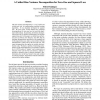Free Online Productivity Tools
i2Speak
i2Symbol
i2OCR
iTex2Img
iWeb2Print
iWeb2Shot
i2Type
iPdf2Split
iPdf2Merge
i2Bopomofo
i2Arabic
i2Style
i2Image
i2PDF
iLatex2Rtf
Sci2ools
108
click to vote
AAAI
2000
2000
A Unified Bias-Variance Decomposition for Zero-One and Squared Loss
The bias-variance decomposition is a very useful and widely-used tool for understanding machine-learning algorithms. It was originally developed for squared loss. In recent years, several authors have proposed decompositions for zero-one loss, but each has significant shortcomings. In particular, all of these decompositions have only an intuitive relationship to the original squared-loss one. In this paper, we define bias and variance for an arbitrary loss function, and show that the resulting decomposition specializes to the standard one for the squared-loss case, and to a close relative of Kong and Dietterich's (1995) one for the zero-one case. The same decomposition also applies to variable misclassification costs. We show a number of interesting consequences of the unified definition. For example, Schapire et al.'s (1997) notion of "margin" can be expressed as a function of the zero-one bias and variance, making it possible to formally relate a classifier ensem...
| Added | 01 Nov 2010 |
| Updated | 01 Nov 2010 |
| Type | Conference |
| Year | 2000 |
| Where | AAAI |
| Authors | Pedro Domingos |
Comments (0)

